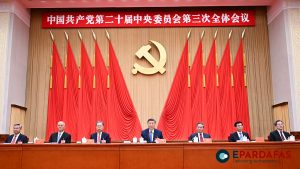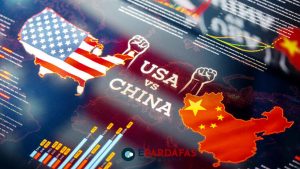
China’s Foreign Investment Indicator Shows Negative Reading for 1st Time

China has recorded its first quarterly foreign investment deficit since 1998, underscoring the trend of foreign companies exiting the nation in response to economic challenges and geopolitical tensions.
Direct investment liabilities, a gauge of foreign direct investment (FDI), dropped by $11.8 billion in the third quarter, according to preliminary data published by China’s State Administration of Foreign Exchange on Nov. 3. That marks the first time China has suffered a shortfall in foreign investment since 1998 when the bureau started recording data.
The latest official data signal more trouble for the world’s second-largest economy, which is faltering amid a property crisis and historically high youth unemployment (for those aged 16 to 24).
Analysts suggest the FDI decline is linked to China’s interest rate disadvantage.
“Some of the weakness in China’s inward FDI may be due to multinational companies repatriating earnings,” Goldman Sachs wrote in a note, as reported by Reuters. “With interest rates in China ‘lower for longer’ while interest rates outside of China ‘higher for longer,’ capital outflow pressures are likely to persist.”
Some experts believe the drop in direct investment liabilities, which track the financial transactions of foreign-owned businesses in China, is likely influenced by geopolitical tensions with the West.
Julian Evans-Pritchard, head of China economics at Capital Economics, said the unusually large interest rate gap “has led firms to remit their retained earnings out of the country,” according to Reuters.
Although he sees little evidence that foreign companies are, on aggregate, reducing their presence in China, “we do think that, over the medium-term at least, increasing geopolitical tensions will hamper China’s ability to attract FDI and instead favor emerging markets that are more friendly to the West.”
Worst Outlook in Decades
According to a survey from the American Chamber of Commerce (AmCham) in Shanghai, 60 percent of respondents cited growing U.S.-China tensions as a critical challenge in China. The AmCham said in the annual report that the investment climate for U.S. businesses in China was the worst in decades.
“The report showed that amid US-China bilateral tensions, Covid disruptions, and macroeconomic pressures, member companies report worsening business results and a less optimistic outlook for China.
“2023 was supposed to be the year investor confidence and optimism bounced back after years of Covid disruptions and restrictions,” the report said. “However, the rebound has not materialized, and business sentiment has continued to deteriorate.
“Despite the end of COVID-era constraints, the percentage of companies describing themselves as optimistic or slightly optimistic hit a record low of 52 percent,” the report found. That was the lowest business confidence level that AmCham has recorded since its first report in 1999.
Last month, a report from the Atlantic Council GeoEconomics Center and Rhodium Group, a Washington-based think tank, suggested that China’s economy needed structural reform.
“The economic malaise that policymakers in Beijing are staring down now is not caused by cyclical factors like Covid, but by a failure to reform the country’s economic system,” it noted.
The report indicated the root problem of China’s economy is its “persistent structural reform gap,” which resulted in “lagging behind” advanced economies “in most market dimensions.”
Deteriorating Business Environment
Several raids and arrests earlier this year have rattled foreign investors. According to data from Goldman Sachs cited by Reuters, China’s foreign exchange outflows in September sharply increased to $75 billion, the most substantial monthly increase since 2016.
The challenges confronting U.S. companies operating in China extend beyond concerns like state subsidies for Chinese competitors and intellectual property theft. A fresh set of issues, including “exorbitant fines without any explanation” and investigations into U.S. firms, were highlighted by Commerce Secretary Gina Raimondo during her visit to China in late August while speaking to senior Chinese economic officials.
What compounds the situation is the vaguely worded anti-espionage law, which went into effect on July 1. The legislation expanded the scope of “espionage activities” to include “documents, data, materials, or items related to national security and interests” without specifying what falls under national security. Ms. Raimondo said the amendment to the legislation is “unclear and sending shockwaves through the U.S. community.”
“Increasingly, I hear from American business that China is uninvestible because it’s become too risky,” she told reporters aboard a high-speed train to Shanghai on the night of Aug. 29.
Since March, the Chinese authorities have raided due-diligence company Mintz and consulting firm Capvision, questioned Bain & Co.’s staff, and investigated chipmaker Micron.
Reuters and Indrajit Basu contributed to this report.












Comments